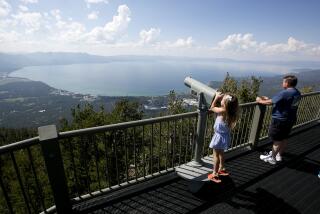Ventura Wants Tax on Residents to Dredge Keys : Environment: Homeowners protest plan to have them bear most of the cost of keeping channels clear of sediment.
- Share via
The city of Ventura wants to form a special tax district around the Ventura Keys neighborhood, charging nearly 300 waterfront households $1,680 a year each to keep the channels clear of debris and sediment, officials announced Friday.
City staff will present a proposal at Monday’s City Council meeting for an assessment district to raise money for dredging. The proposal comes after years of often acrimonious debate between homeowners and city officials over who bears responsibility for maintaining the boat channels that wind through the neighborhood.
No action will be taken on the matter until after a public hearing on Sept. 23.
Ventura officials believe taxing property owners in the Keys for 75% of the cost is the best way to pay for dredging the sediment that rainfall drains into the Keys from the Arundell Barranca. The city would pay for the remaining 25%.
But Keys homeowners say they are furious about the proposal, raised in a letter received by homeowners Friday.
Property owners say it is the city’s responsibility to pay for keeping the Keys clear of silt and debris. They vow to battle the city every step of the way.
“We’re going to fight it,” said Sandy Nickerson, who plans to address the council Monday. “All the city’s drainage goes into the Keys and yet they are trying to assess a very small percentage of people” to clean it up.
“It’s outrageous,” said Donald M. Adams Jr., an attorney who lives at the Keys. “The city owns the public waterways and it is the city that owns the land that drains. . . . Yet they are trying to ram this assessment district down our throats.”
But Mayor Richard Francis said the only fair way to resolve the issue is to create an assessment district with the financial burden on Keys residents.
“It’s necessary and proper,” Francis said. “It’s a financing mechanism designed for circumstances like this. It is inappropriate to tax all the citizens of Ventura for a small group of residents’ own special back-yard thrill.”
The proposal, prepared for the city by an engineering firm, calls for spending $2,770,000 to dredge and dispose of sediment and other debris over a 20-year period.
Terry Rodrique, an engineer with Willdan Associates, said he determined that part of the main channel of the Keys is used for general recreation by non-residents. Therefore, he said, the city should pay about $681,000 of the cost of the project.
But most of the Keys waterways are used almost exclusively by homeowners who have boats tied in back of their expensive houses.
To establish an assessment district, the City Council must approve a resolution by majority vote. If a majority of affected property owners object to the district, then the council must pass the proposal again by a 6-1 vote.
Adams said Friday that dredging is not a permanent solution. He suggested that the city reroute the flow of drainage water from the barranca that empties into the Keys, and direct the runoff into the Santa Clara River. City officials estimate that such a project would cost about $30 million, which Adams said should be paid by the city and the county.
Adams has filed a federal lawsuit on behalf of several homeowners against the U.S. Environmental Protection Agency, the city of Ventura and Ventura County for alleged violations of the Clean Water Act by allowing polluted water to be dumped into the Keys.
In May, 82 other Keys property owners filed a similar action in Ventura County Superior Court.
The lawsuits are still pending.
The city initially considered adopting an assessment district in May, 1990, to finance dredging, but the proposal was tabled for further study.
On Monday night, the City Council will be asked to adopt a resolution acknowledging receipt of the engineer’s report and to set a public hearing on the matter.
The council is also expected to set the boundaries of the proposed district and adopt a resolution to test the water in the Keys for sewage-related bacteria.
More to Read
Sign up for Essential California
The most important California stories and recommendations in your inbox every morning.
You may occasionally receive promotional content from the Los Angeles Times.










